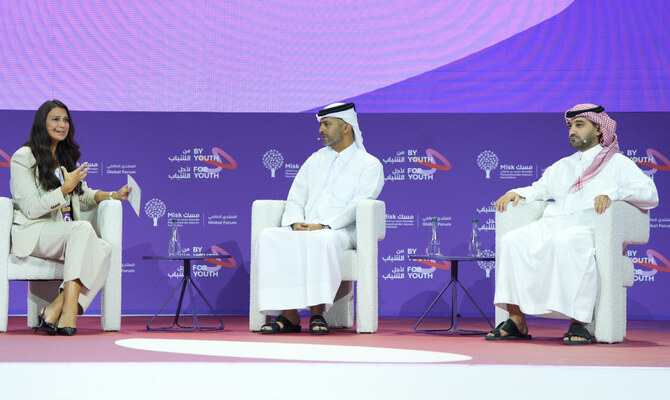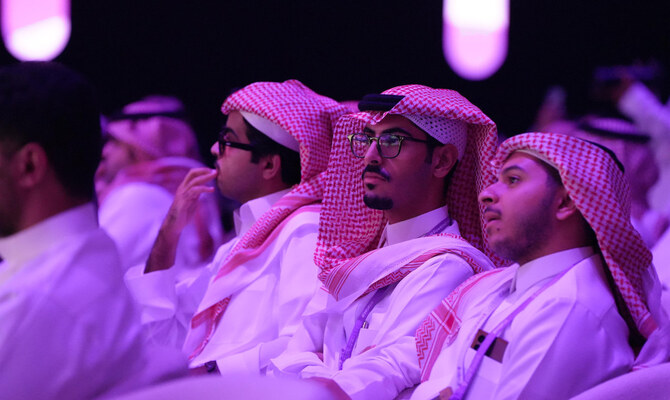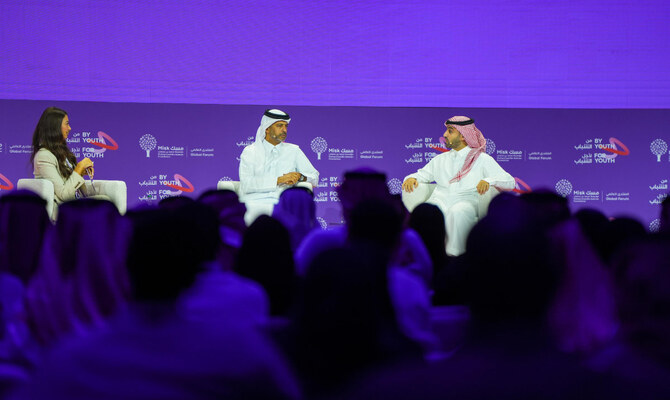RIYADH: Nasser Al-Khater, the CEO of FIFA World Cup Qatar 2022, shared his thoughts on some of the challenges and opportunities his country encountered when hosting one of the biggest global sports events, and passed on some words of wisdom during a discussion at the 2024 Misk Global Forum in Riyadh with Hamad Albalawi, the head of the Saudi Arabian Sports Federation’s Bid Unit for the 2034 World Cup.
Describing the 2022 event as “the best-ever World Cup in the history of the tournament,” Albalawi said 3.2 million tickets were sold, a 17 percent increase compared with the 2018 World Cup in Russia, and it was the most sustainable tournament to date.
As such, football authorities worldwide can learn many lessons from Qatar about hosting future World Cups and other major events, he added.
“You saw a World Cup that put the fan at the very center … that created an experience for fans that were able to engage with the tournament beyond the 90 minutes,” Albalawi said on Tuesday, the second and final day of the Misk event.
However, hosting the competition did not come without significant challenges. Some of the biggest that authorities had to overcome included the problems caused by the global COVID-19 pandemic, the logistics of organizing a World Cup in a country undergoing great infrastructural development, and issues related to the welfare of workers, Al-Khater said.
However, one of the most significant hurdles was the intense media scrutiny and the constant battle against public perceptions.
“From the bid stage, the challenge was people not taking us seriously, not seeing us as a serious contender,” Al-Khater said.
Toward the end of the bidding process, as people started to realize how strong a contender for host Qatar really was, “they tried to discredit us as much as possible,” he added.
Al-Khater spoke in particular about the effects reporting by the mainstream media has on public perceptions. He said the task of trying to counter this by educating people had at times distracted from the crucial job of actually organizing a major, unforgettable event.
However, people eventually began to tire of the constant narrative, he added, started to question it and reflect on social and political issues in their own countries, and in doing so they slowly realized a double standard might be at play.
Al-Khater said 1.4 million people visited Qatar to experience the World Cup firsthand, many of whom raved about the safety and beauty of the country, and the hospitality of the Arab world; an image that jarred with the picture painted by the mainstream media.
“Women said, ‘We have never felt so safe at football matches in our lives,’” he added.
Albalawi said that when the Saudi bid team entered the room with their counterparts from other nations, he realized that the average ages of the members of those other teams were in the 50s and 60s, while the average age of the Saudi team was between 31 and 32.
“It made me think to myself, do we have the experience? Do we have the knowledge? Do we have the know-how?” he admitted.
But after reflecting on Saudi Arabia’s Vision 2030 plan for national development and diversification, and how much it has achieved in the past nine years, he reconsidered his initial reaction.
“Although we do not have 20 years of experience, we have projects that we have managed that are more sophisticated than any other set of projects around the world,” Albalawi said.
“The Saudi youth is one of the most capable youths of the world. We have a lot of energy, we have a lot of will, we have very capable minds and we have a demographic that is the envy of every nation in the world.”
Asked how confident he is that the Saudi bid to host the 2034 World Cup will be successful, Albalawi replied: “Very confident. Saudi Arabia is a story of growth … of remarkable transformation. It will be written in the history books for decades and centuries to come; this era and this age will be remembered for the achievements we have created.”
Al-Khater noted that the experience of hosting the World Cup had a big effect in his country on young people in particular.
“The youth in Qatar were quite lucky that they have been able to witness a country that was growing together and living a sense of nationwide pride,” he said.
This feeling of pride and national unity instilled a sense of teamwork at the macro and micro levels that was reflected throughout society, from large national projects to small teams working in schools and universities, he added.
Great efforts were made to ensure the youth of the country were included in the planning process for the World Cup by creating programs in schools and online tools, for example, to help them understand the significance of the event to Qatar, and by recruiting students to work as volunteers at the event itself, Al-Khater said.
The World Cup can be used as a “developmental tool” and the youth of a nation are “your biggest ambassadors,” he added.
“Everywhere else, it is just the World Cup; for our part of the world, this is a strategic project and it is an ambition that goes far beyond sports.”
Albalawi’s message to Saudi youth was to embrace the prospect of the Kingdom hosting 2034 World Cup as an opportunity to “become your best in anything you do, whether that is the best engineer, football administrator, health professional, architect,” and “to see that growth in yourself and the connections around you all the way through.” He added: “The World Cup is an enabler to all of the different projects.”
Another piece of advice he offered to young people was to be diligent in everything they do, always triple-check that they have considered everything they need to, and to ask questions of everyone who can help them ensure they always stay ahead of the game.
Al-Khater’s advice to the people of Saudi Arabia was: “Always keep the big picture in mind because we can sometimes, through our own panic, veer off and start looking at micro issues.
“You need to hold yourself and start to zoom out. Learn how to manage up. Expectations are quite high in this part of the world, rightfully so. One big task that I have to go through is learning how to manage up and not just delivering on the ground.”




































